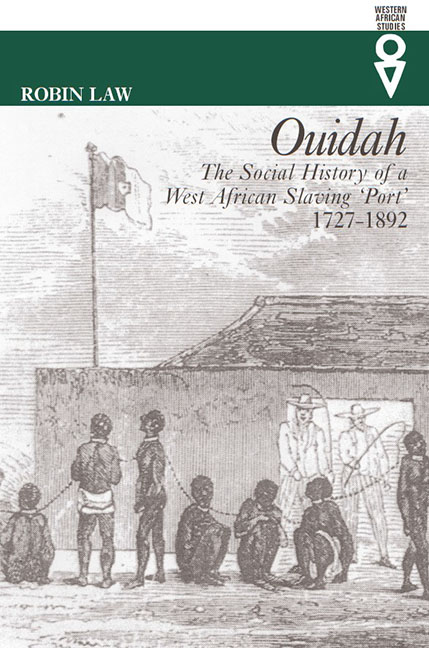Book contents
- Frontmatter
- Dedication
- Contents
- List of Maps & Tables
- Acknowledgements
- Abbreviations
- Map
- Introduction
- 1 Origins: Ouidah before the Dahomian conquest
- 2 The Dahomian Conquest of Ouidah
- 3 Dahomian Ouidah
- 4 The Operation of the Atlantic Slave Trade
- 5 De Souza's Ouidah The era of the illegal slave trade 1815 –39
- 6 The Era of Transition From slaves to palm oil 1840–57
- 7 Dissension & Decline Ouidah under King Glele 1858–77
- 8 From Dahomian to French Rule 1878-92
- Sources & Bibliography
- Index
8 - From Dahomian to French Rule 1878-92
Published online by Cambridge University Press: 25 October 2017
- Frontmatter
- Dedication
- Contents
- List of Maps & Tables
- Acknowledgements
- Abbreviations
- Map
- Introduction
- 1 Origins: Ouidah before the Dahomian conquest
- 2 The Dahomian Conquest of Ouidah
- 3 Dahomian Ouidah
- 4 The Operation of the Atlantic Slave Trade
- 5 De Souza's Ouidah The era of the illegal slave trade 1815 –39
- 6 The Era of Transition From slaves to palm oil 1840–57
- 7 Dissension & Decline Ouidah under King Glele 1858–77
- 8 From Dahomian to French Rule 1878-92
- Sources & Bibliography
- Index
Summary
The British blockade of Ouidah in 1876–7 was ineffective, indeed counterproductive, in terms of its declared objectives. The attempt to intimidate the Dahomian authorities had backfired; British prestige and influence in Dahomey were weakened rather than strengthened. In fact, the most obvious and immediate consequence of the blockade was the collapse of British trade at Ouidah. In the following year, it was noted that, although Turnbull, the agent of the firm of Swanzy who had provoked the British intervention, was still resident at Ouidah, he was doing little business, because local people were afraid to be associated with him. A few years later, Swanzy sold its establishment in the English fort to a German firm, C. Goedelt of Hamburg; the transfer was announced in a letter from the German government to Glele in 1882. Thereafter, British interest in Dahomey and Ouidah effectively ceased; subsequent attempts by Dahomey to elicit British intervention, as a counterweight to the growing threat of French imperialism, came to nothing.
The British intervention also had the effect of provoking French countermeasures to assert and protect their interests in the area. In April 1878 a French officer, Paul Serval, visited Ouidah and obtained a new treaty confirming the cession of Cotonou to France. The status of this treaty, which, like that of 1868, was negotiated with the local authorities in Ouidah only, was doubtful, and it was later repudiated by Glele. But the matter was not yet put to the test, since the French, beyond stationing a Resident at Cotonou, took no immediate steps to establish effective occupation of the town, which remained under Dahomian administration. In relation to its European rivals, however, the French claim had been reasserted. The British responded by extending the territory of their own Lagos colony further westwards to occupy Ketonou, 15 km north-east of Cotonou, thus threatening communication between Cotonou and Porto-Novo, in 1879.
This concentration of French interest on Cotonou reflected in part the relative weakness of Dahomian control there, but also its increasing commercial importance and the relative decline of Ouidah.
- Type
- Chapter
- Information
- OuidahThe Social History of a West African Slaving Port 1727-1892, pp. 263 - 280Publisher: Boydell & BrewerPrint publication year: 2017



